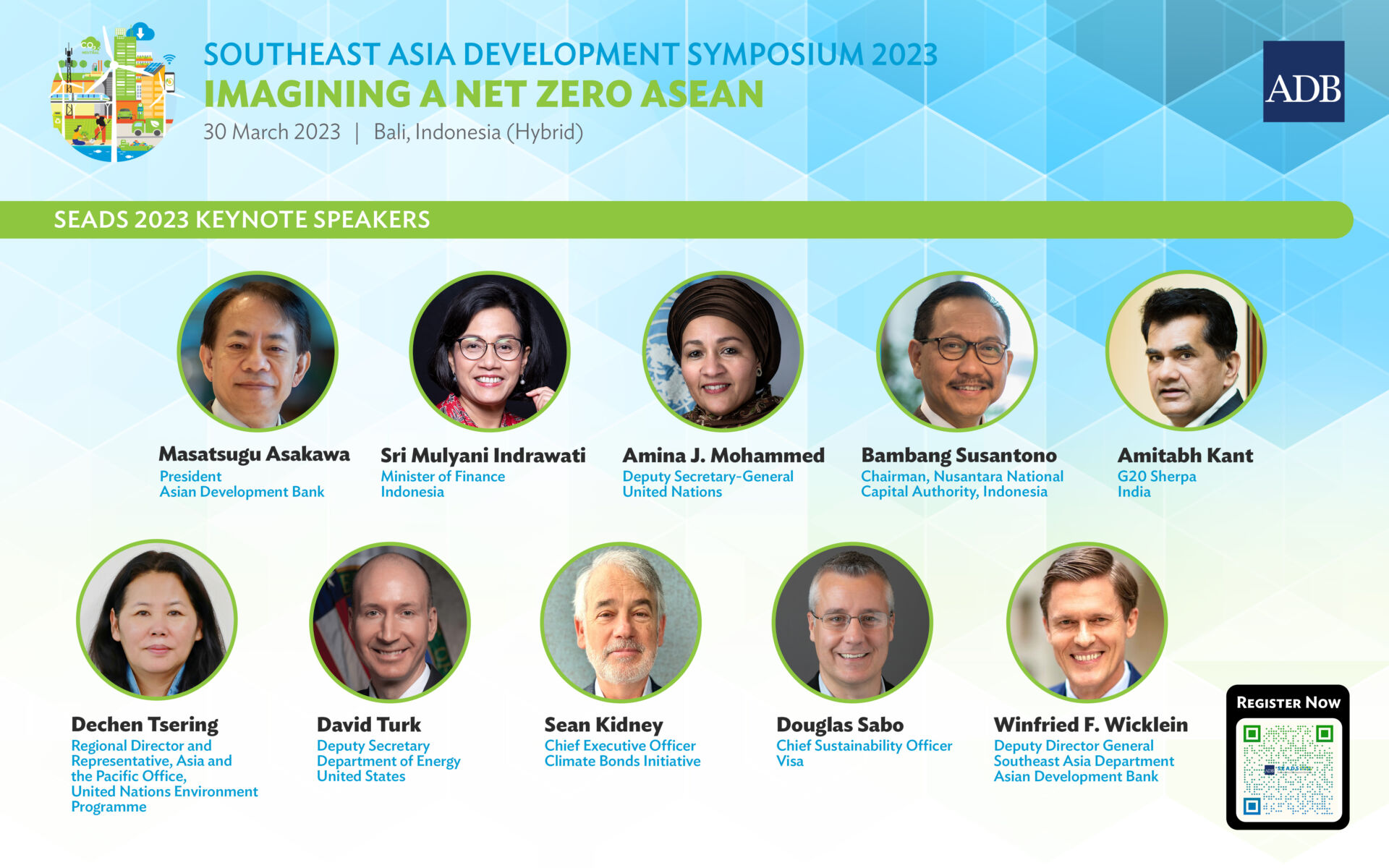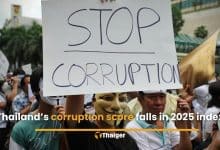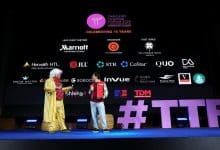ADB SEADS 2023: Imagining a Net-Zero ASEAN

Key Takeaways
- ADB’s fourth Southeast Asia Development Symposium (SEADS) will bring together decision-makers, innovators, and climate leaders from government, industry, academia, and the development sector to discuss practical ways to achieve carbon neutrality by 2050.
- SEADS 2023’s plenary panel discussion, “Financing Net Zero,” will explore measures to bridge the gap in climate financing, and enable countries in ASEAN to attain net-zero and the Sustainable Development Goals.
- SEADS 2023 will launch a new ADB report, ASEAN and Global Value Chains: Locking in Resilience and Sustainabliity, which provides actionable insights for strengthening ASEAN’s value chain resilience against the impacts of climate change.
- ADB SEADS 2023 will be a low-carbon event, with less than 10% of participants travelling to the sustainable venue, and with carbon offsets for every attendee.
Southeast Asia is one of the world’s most vulnerable regions to the impacts of climate change. Climate impacts in the region continue to grow more severe, disproportionately affecting vulnerable communities, and placing millions at risk of being thrown back into extreme poverty.
In response, countries in Southeast Asia have committed to decarbonization, with eight out of 10 member states of the Association of Southeast Asian Nations (ASEAN) at COP26 pledging to achieve net-zero targets by 2050. Many non-state actors have also made strong net-zero commitments. This alignment presents opportunities for partnership that can potentially accelerate a sustainable and just transition to a low-carbon future for ASEAN.
The Asian Development Bank’s (ADB) fourth Southeast Asia Development Symposium (SEADS): Imagining a Net-Zero ASEAN, on 30 March in Bali, Indonesia will bring together decision-makers, innovators, and climate leaders from government, industry, academia, and the development sector to discuss practical ways to achieve carbon neutrality by 2050.
The hybrid event will be held in-person at the Bali International Convention Center at The Westin Resort Nusa Dua, with a simultaneous broadcast online. A total of 500 in-person and more than 5,000 virtual participants are expected.
SEADS 2023 builds on the successes of Indonesia’s G20 presidency in 2022, which placed the global transition toward a low-carbon economy at the forefront of the agenda. It is a key side-event of the ASEAN Finance Ministers and Central Bank Governors’ Meeting on 28–31 March, also in Bali.
SEADS 2023 agenda and priority areas
ADB President Masatsugu Asakawa will provide welcoming remarks at SEADS 2023. President Asakawa has noted the urgent need for climate action in Asia and the Pacific, and under his leadership, ADB has raised its ambition to $100 billion in cumulative climate finance to its developing member countries through 2030.
Indonesia Minister of Finance Sri Mulyani Indrawati will provide the opening keynote address. Indonesia has made strong net-zero commitments and is a climate leader in Southeast Asia. It has partnered with ADB to support the Energy Transition Mechanism, which will accelerate the country’s shift to a low-carbon future in a just and affordable manner.
Other morning keynote speakers offering unique perspectives on tackling the climate crisis include: United Nations Deputy Secretary-General Amina J. Mohammed, a leader in implementing the sustainable development agenda; India’s G20 Sherpa Amitabh Kant, a dynamic promoter of a circular economy to address climate impacts; US Department of Energy Deputy Secretary David Turk, a proponent of clean energy innovation; and Climate Bonds Initiative Chief Executive Officer (CEO) Sean Kidney, a champion of sustainable finance.
Bloomberg TV Anchor and Chief Markets Editor David Ingles will moderate the plenary panel discussion, Financing Net Zero, which will explore measures to bridge the gap in climate financing and enable countries in ASEAN to attain net zero and the Sustainable Development Goals. Panelists include ADB Vice-President (Operations 2) for East Asia, Southeast Asia, and the Pacific Ahmed M. Saeed; Philippine Central Bank (BSP) Governor Felipe Medalla; Climate Investment Funds CEO Mafalda Duarte; Glasgow Financial Alliance for Net Zero Asia–Pacific Network Managing Director Yuki Yasui; and Singapore Exchange Managing Director, Head of Sustainability and Sustainable Finance Herry Cho.
The afternoon agenda will feature keynote talks from Nusantara National Capital Authority Chairman Bambang Susantono; United Nations Environment Programme Asia and the Pacific Office Regional Director and Representative Dechen Tsering; and Visa’s Chief Sustainability Officer Douglas Sabo.
Nine thematic breakout sessions will focus on deploying technology in climate change mitigation and adaptation; designing low-carbon and climate-resilient cities; shifting to clean energy; ensuring an inclusive net-zero ASEAN economy; minimizing climate effects on health and health care delivery; ensuring the blue economy leads to net zero; mobilizing finance for net zero; reimagining ecotourism; and deploying the cloud to meet climate goals.
Report launch: ASEAN and Global Value Chains: Locking in Resilience and Sustainability
SEADS 2023 will launch a new ADB report, Global Value Chains in Southeast Asia: Building Resilience and Sustainability, which provides actionable insights for strengthening the region’s value chain resilience against climate impacts.
ADB Southeast Asia Department Director General Ramesh Subramaniam will discuss insights from the report in a fireside chat.
A low-carbon, hybrid event
ADB SEADS 2023 will be a low-carbon event, with less than 10% of participants traveling to the sustainable venue. It is partnering with the Green Steps Group to monitor the event’s carbon footprint and ensure full carbon offset through the planting of equivalent forest cover.
To participate in SEADS 2023, register online. Virtual participation has no deadline. Registration is free.
For regular updates, visit the SEADS website and subscribe to the SEADS newsletter.
SEADS 2023 is co-organized with the ASEAN Catalytic Green Finance Facility (ACGF) and supported by 17 outreach partners and 12 media networks.
Press Release
Latest Thailand News
Follow The Thaiger on Google News:


























